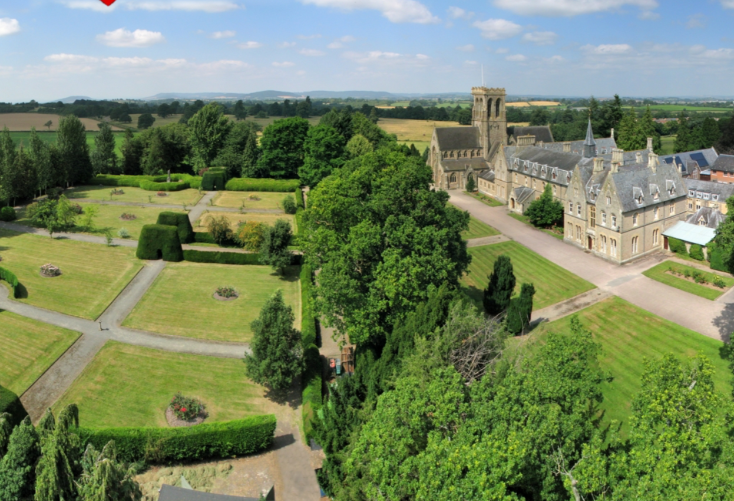Message of Abbot Paul - Tuesday 2nd August
Abbot Paul • August 1, 2022

Message from Fr Paul for Tuesday, 2nd August 2022
It was a great joy to welcome Cardinal Vincent Nichols to Belmont yesterday. He came to visit his old friend, Bishop Mark, and joined the community for midday prayer, lunch and recreation. It was also a real pleasure to meet Sr Carmel, who came with him. Welcoming guests is an important part of the monastic tradition, as we read in the Rule of St Benedict, and Belmont is renowned for the warm, friendly welcome we give to all those who come to visit or stay with us.
Our reading from Matthew today, (Mt 14: 22-36), recounts the episode of Jesus walking on the water, which takes place following on from the feeding of the five thousand. “Jesus made the disciples get into the boat and go on ahead to the other side while he would send the crowds away. After sending the crowds away he went up into the hills by himself to pray.” At last, Jesus has some time to himself in quiet, with not even his disciples to interrupt him. Moments of solitude and silent reflection are good for all of us. Jesus shows us how necessary they are. Life cannot be all activity and noise. Jesus had this predilection for going up into the hills. While he was at prayer, not all was well with the disciples. “When evening came, he was there alone, while the boat, by now far out on the lake, was battling with a heavy sea, for there was a head-wind.” Although no more than a large lake, nevertheless the water can get very rough on the Sea of Tiberius. “In the fourth watch of the night, he went towards them, walking on the lake, and when the disciples saw him walking on the lake, they were terrified. ‘It is a ghost’ they said, and cried out in fear.” The fourth was the last watch of the night, from 3am onwards, and the most frightening. It was believed that demons were abroad, returning to their homes after a night’s activities. This explains the fear of the disciples on seeing Jesus come towards them, walking on the sea, and crying out, believing him to be a ghost. Even today we talk about the darkest hour being just before dawn. If I’m not mistaken, it was at the fourth hour that the children of Israel crossed the Red Sea at the Exodus.
Once the voice of Jesus is heard, fear evaporates, but then the strangest thing happens, something quite unexpected. “But at once Jesus called out to them, saying, ‘Courage! It is I! Do not be afraid.’ It was Peter who answered. ‘Lord,’ he said ‘if it is you, tell me to come to you across the water.’ ‘Come’ said Jesus.” Peter was prone to speaking without thinking and often came out with the strangest occurrences. Why did he want to walk on the water? To be more like his master? To be truly sure that this was Jesus? To put Jesus to the test, or to test his own faith? Either way, Jesus invites him to step forward. “Then Peter got out of the boat and started walking towards Jesus across the water, but as soon as he felt the force of the wind, he took fright and began to sink. ‘Lord! Save me!’ he cried. Jesus put out his hand at once and held him. ‘Man of little faith,’ he said ‘why did you doubt?’”
While he fixed his gaze on Jesus, Peter waked tranquilly on the water, but once he began to think about himself and his own safety, he began to sink and screamed out for help. To be a person of “little faith” we have only to stop looking to Jesus and start looking instead to our own strength and ability. Yet there are times when we think more of ourselves than we do of Jesus, and that’s when things begin to go wrong. “And as they got into the boat the wind dropped. The men in the boat bowed down before him and said, ‘Truly, you are the Son of God.’” What Jesus has done causes the men in the boat, both disciples and crew, to recognise that Jesus is “truly the Son of God.”
No sooner than they land that crowds once more gather with their sick, begging that he heal them. Just as we hear repeated the phrase, “Truly, you are the Son of God,” so too the knowledge that healing comes from simply touching his garments: “they begged him just to let them touch the fringe of his cloak. And all those who touched it were completely cured.” Thinking back to my days in Peru, one of the most moving scenes was to see people rubbing their heads and their children’s heads and limbs with the tabernacle veil or with my chasuble, or simply touching me and then crossing themselves. It happened constantly and always brought tears to my eyes. I must confess to having witnessed many miracles.









